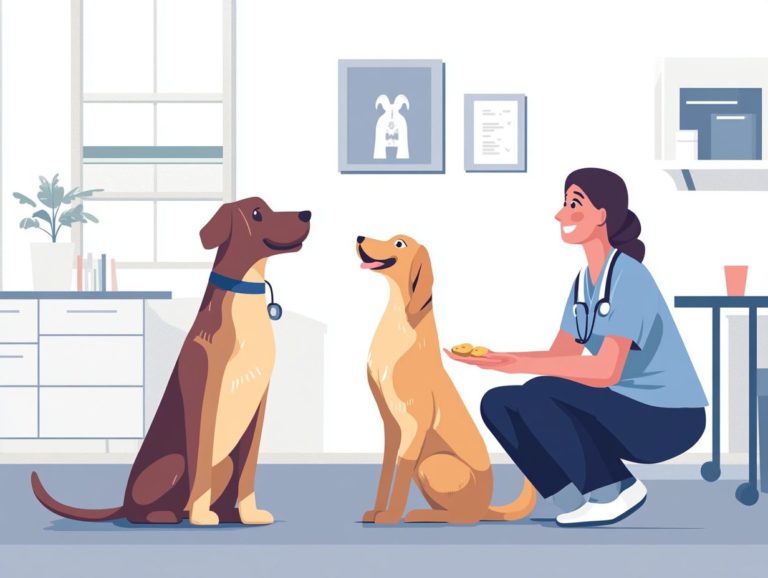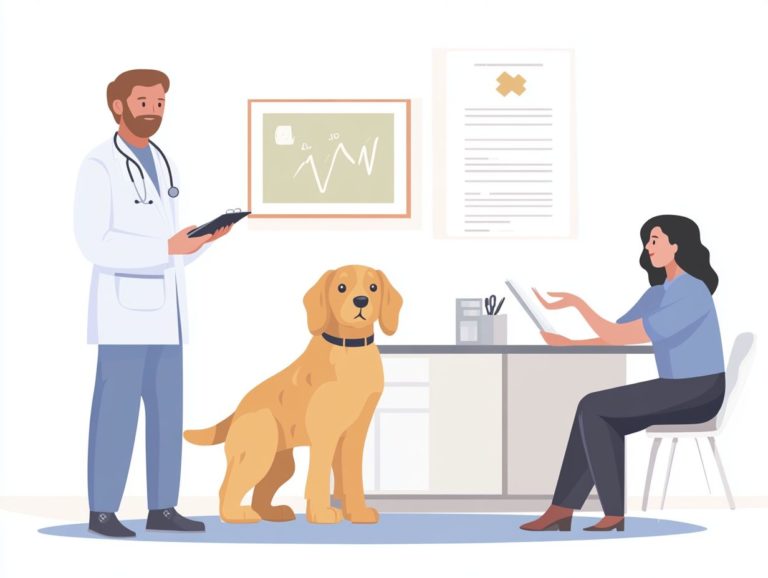The Role of Pet Trainers in Anxiety Management
Pets possess a remarkable ability to comfort and soothe, especially in times of anxiety. Understanding the connection between pets and emotions shows how furry companions help manage stress.
The advantages of pet ownership extend far beyond mere companionship. Proper training can elevate this relationship and offer additional support. From training to help your pet behave well to emotional support techniques, you ll discover how the right training can transform both your pet and your mental well-being.
Explore effective strategies and gather tips on choosing the ideal pet trainer to guide you on this enlightening journey.
Contents
- Key Takeaways:
- The Connection Between Pets and Anxiety
- The Importance of Pet Training
- Different Approaches to Pet Training
- Working with a Pet Trainer
- Strategies for Enhancing Pet Support in Managing Anxiety
- Frequently Asked Questions
- What is the role of pet trainers in anxiety management?
- How can pet trainers help with anxiety management?
- Do pet trainers specialize in anxiety management?
- What techniques do pet trainers use for anxiety management?
- Can pet trainers help with my own anxiety as well?
- Are there any specific types of pets that pet trainers work with for anxiety management?
- Common Questions About Pet Trainers
Key Takeaways:
- Pet training can be a valuable tool in managing anxiety in both humans and animals.
- Behavioral training helps pets learn coping mechanisms for anxiety triggers.
- Working with a qualified pet trainer greatly improves anxiety management techniques.

The Connection Between Pets and Anxiety
The bond between pets and anxiety is truly remarkable. Pets have a unique ability to offer emotional support to those grappling with anxiety disorders, such as PTSD and depression.
Research indicates that having a pet nearby can evoke positive emotional states. This can effectively alleviate anxiety symptoms. Additionally, it boosts overall mental well-being.
Take anxious dogs, for instance; they can respond favorably to various training techniques. This not only enhances their behavior but also amplifies their capacity to provide comfort during anxiety episodes.
Understanding the Science Behind It
Did you know pets can pick up on your mood? They re incredible at sensing your feelings, which requires recognizing the emotional states of both animals and humans, along with body language that indicates feelings of comfort or distress.
Research reveals that pets are remarkably perceptive, often picking up on your mood through subtle cues, like your tone of voice and facial expressions. This heightened intuition allows them to respond with affection and calmness, offering a soothing presence during your emotional ups and downs.
Studies have shown that engaging with pets can lead to lowered cortisol levels and increased oxytocin. These are important hormones that help with anxiety. Interestingly, incorporating calming music during these interactions helps relax your pet while boosting your own mood, creating a shared sanctuary of tranquility that benefits both you and your furry companion.
The Importance of Pet Training
Pet training is crucial not just for achieving obedience and good behavior, but also for nurturing a strong, supportive bond between you and your furry friend. This connection is especially important in managing anxiety and behavioral challenges.
By employing effective training techniques like positive reinforcement and socialization, you can help your dog build confidence and mitigate anxiety triggers. This transforms them into a more understanding and reliable companion, particularly for those navigating mental health concerns.
How Training Can Help with Anxiety Management

Training plays a vital role in managing anxiety by fostering positive connections between you and your pet. This creates a more supportive companionship that can alleviate your symptoms, and understanding the role of routine in pet anxiety management can further enhance this process.
Different training methods, like positive reinforcement and desensitization, serve as effective tools in building this bond. Positive reinforcement encourages desirable behaviors by rewarding your pet, which not only strengthens your connection but also enhances your pet s responsiveness to you. On the flip side, desensitization techniques help your pet acclimate to various anxiety triggers, making them less reactive over time.
The emotional support pets provide is invaluable; they offer a calming presence that can be essential for anyone grappling with anxiety. Psychiatric service dogs take this a step further by providing specialized assistance during anxiety attacks, helping you regain a sense of stability and control.
If you re considering ways to enhance your companionship with your pet, think about exploring training options. They can make a significant difference in both your lives.
Different Approaches to Pet Training
Explore various types of pet training tailored to meet the distinct needs of both pets and their owners.
Options like behavioral training and emotional support animal training use a range of techniques, including gradual exposure and changing how your pet reacts to certain triggers, ensuring a comprehensive approach to your pet s development.
Behavioral Training
Behavioral training is essential for addressing specific issues your pet may exhibit. These issues can cause anxiety for both you and your furry friend.
Common problems, such as excessive barking, separation anxiety, and destructive chewing, can amplify stress for everyone involved. These challenges not only disrupt a harmonious living environment but can also lead to feelings of frustration and helplessness for you as the owner.
Understanding the root causes of these behaviors is vital. Often, triggers like loud noises or unfamiliar visitors can exacerbate anxiety.
Utilizing training techniques such as positive reinforcement, desensitization, and establishing a consistent routine can significantly alleviate these issues. By identifying triggers early on, you can implement effective strategies to create a calmer atmosphere for both you and your pet.
Emotional Support Animal Training
Emotional support animal training prepares pets to provide comfort and companionship to individuals facing emotional or psychological challenges. This training enhances coping skills and overall emotional wellbeing.
This training often involves teaching animals to recognize and respond to specific calming signals from their owners. This enables them to instinctively offer support during moments of distress.
In contrast to regular emotional support animals, psychiatric service dogs undergo a more rigorous training regimen. These dogs are specially trained to help their owners manage anxiety and other challenges, such as sensing anxiety attacks and providing physical grounding. They can remind their handler when it s time to take medication. This showcases a deeper level of interaction that transcends mere companionship.
This distinction underscores the crucial role these trained companions play in managing mental health challenges.
Working with a Pet Trainer

Collaborating with a professional pet trainer can profoundly elevate the effectiveness of your training methods for managing anxiety. Additionally, considering veterinary advice in managing pet anxiety ensures that both you and your pet acquire the essential skills needed to navigate emotional discomfort with confidence and ease.
Finding the Right Trainer for Your Needs
Finding the right trainer means closely examining their training philosophy and experience in addressing specific behavioral issues that affect your pet’s ability, including utilizing obedience training to ease anxiety.
It’s essential to dig deeper into the trainer’s background, including their education and any relevant certifications in animal behavior or specialized techniques. For more information, you can explore best practices for pet anxiety training focused on anxiety reduction.
Consider reaching out to veterinarians or pet owners who have navigated similar challenges. Their recommendations can offer valuable insights into a trainer’s effectiveness.
A reputable trainer should willingly share success stories from clients, showcasing their proven track record with anxious pets.
Monitor their methods; positive reinforcement techniques are the most effective and humane ways to build trust and confidence in both you and your pet.
Strategies for Enhancing Pet Support in Managing Anxiety
You can also explore several strategies that will significantly enhance your pet’s ability to assist in managing anxiety. Consider creating a safe space where they feel secure, incorporating calming music to soothe their nerves, and utilizing various treatment options specifically designed for anxiety management.
These thoughtful approaches can greatly enrich the experience for both you and your pet.
Take action today by reaching out for training help or implementing these techniques to improve your and your pet s wellbeing!
Other Techniques and Resources
Recognizing calming signals from your pets and utilizing pet sitters are just a couple of techniques that can significantly enhance your relationship with them. This makes anxiety management far more effective.
You can also benefit from attending workshops that specialize in pet behavior and communication. These sessions provide valuable insights into your pets’ emotional states, allowing you to understand them better.
Online courses offered by pet care organizations often explore anxiety triggers and coping mechanisms. They equip you with practical skills to support your furry companions.
Joining community groups, whether online or local, helps you connect with fellow pet owners. This gives you the opportunity to exchange tips and experiences.
These supportive networks not only offer encouragement but also create a sense of belonging, positively impacting the emotional well-being of both you and your pets.
Frequently Asked Questions

What is the role of pet trainers in anxiety management?
Pet trainers play a crucial role in helping individuals manage their anxiety through their pet’s behavior and training techniques, but it’s also important to consider the role of veterinary professionals in pet anxiety.
How can pet trainers help with anxiety management?
Pet trainers can teach pets specific behaviors and techniques to provide emotional support and assistance in calming anxious thoughts and feelings, including understanding anxiety triggers in pets.
Do pet trainers specialize in anxiety management?
While not all pet trainers specialize in anxiety management, many have experience and training in understanding the role of trust in training anxious pets and their owners.
What techniques do pet trainers use for anxiety management?
Pet trainers may use a variety of techniques such as positive reinforcement and desensitization to help pets and their owners manage anxiety, utilizing the science behind training anxious pets.
Can pet trainers help with my own anxiety as well?
Although pet trainers primarily focus on training the pet, they can also provide valuable tips and support for owners who may struggle with anxiety themselves, including insights on the role of routine in training anxious pets.
Are there any specific types of pets that pet trainers work with for anxiety management?
Pet trainers are trained to work with a variety of animals. Whether you have a dog, cat, or other pet, they can help with anxiety management techniques specific to that animal, and understanding what makes an effective pet anxiety counselor can enhance the support they provide.
Common Questions About Pet Trainers
For more resources on how to manage anxiety for you and your pet, feel free to explore our website or sign up for our newsletter!






